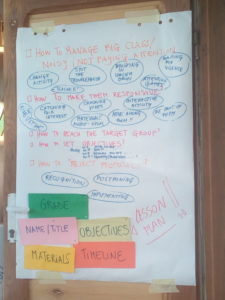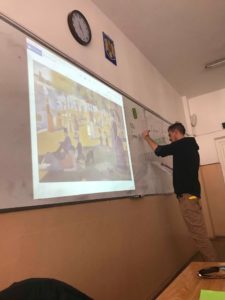First steps with non formal education
When I arrived in Curba de Cultura I knew that because of my project I would have to go to schools to lead classes, propose activities and share knowledge with them in English and French classes; I had been told about non-formal education, we were only then in June and the school holidays had started, so I told myself “we will see later”.
And then, as the summer was over, we were very quickly back to school, and it was time for me to take my first steps in the different schools, not without apprehension! (I had never faced a class in this position before, I have already given tutoring in high schools as well as private language classes but in this way I must admit that I was not reassured…)

Fortunately we were not dropped in the “cage of wild animals” and we received in Curba de Cultura during 3 days, a very enriching, reassuring and funny training on what non-formal education is, non-formal communication, how to set it up and apply it, we received methods, advice and explanations. We put ourselves in situations and we tried each other in “almost” real conditions, (what a laugh that day, we all fell back into childhood!) We were finally ready to start this new activity as serenely as possible (thanks Kristina and Estelle for this training!!!)
Returning to the main theme of this article, non-formal education (which must be distinguished from informal education) can be defined in this way: it proposes a training and learning time designated as such, without this leading to a final validation in the form of an examination to evaluate what has been learned. This lack of a final evaluation corresponds to the state of mind in which it is carried out. It seeks to foster a spirit of initiative in the participant, who is placed on an equal footing with the learner. Autonomy, initiative, democracy, exchange: these are the key words of non-formal education, which proposes, in an open format, to learn things through mechanisms that allow the active participation of all, this can be for example through games, videos, debates, creative workshops, theatre etc.
So it was with all this new knowledge and especially with a lot of impatience that I was waiting for my first class in order to implement all this. The day D having arrived, my activity was ready and settled at the milimetre, stress and apprehension naturally appeared. Fortunately for me, Estelle was present and accompanied me in this brand new experience. Strangely enough, I immediately felt comfortable in this position, in sharing, in feeling that the students were having a good time and that I was too. I knew right away that I would like it a lot. Of course it took me a few weeks to be totally liberated and each new class was and still is a great experience to correct, improve and learn about how to implement non-formal education.
 Today, 3 and a half months after my first experience, I had the opportunity to participate in about forty classes with students ranging from the first grade to the twelfth grade (from the first kindergarten class to the last high school class)
Today, 3 and a half months after my first experience, I had the opportunity to participate in about forty classes with students ranging from the first grade to the twelfth grade (from the first kindergarten class to the last high school class)
We played many games together, sang, drew, watched videos, answered quizzes, tested our memory and concentration, jumped and turned on ourselves… but we also learned many things about cultures, languages, differences, cultural shock, diversity… but above all we had a great time! And it seems to me that this is one of the essential things when you want to transmit knowledge, know-how or even interpersonal skills.
I am happy to have been able to explore and practice this form of education during my volunteer work, which has taught me and brought me a lot of knowledge as much as it has on a personal level and I am now sure that I want to continue and deepen my learning in this way.
/ Traducere in Romana in lucru/
About the author